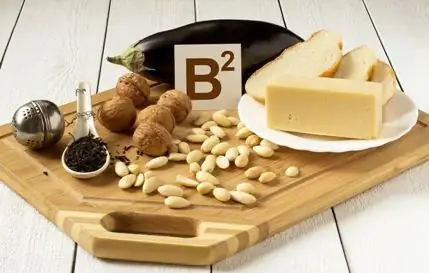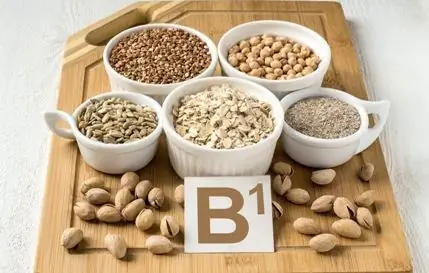- Author Rachel Wainwright wainwright@abchealthonline.com.
- Public 2023-12-15 07:39.
- Last modified 2025-11-02 20:14.
Vitamin B2
Vitamin B2 (riboflavin) is considered a beauty and health vitamin. It has a huge impact on the condition of the human skin. In addition, a lack of vitamin B2 leads to a reduction in life expectancy.

Riboflavin is poorly soluble in water and alcohol; it is destroyed by light.
Riboflavin is synthesized in the human body by the microflora of the large intestine. In addition, it comes from the outside with food.
Biological properties of vitamin B2
Riboflavin takes part in carbohydrate, protein, fat and energy metabolism. In the presence of magnesium, it combines with proteins to form enzymes that regulate cellular respiration. It is necessary for the maturation of erythrocytes in the bone marrow. Vitamin B2 takes part in the dark adaptation process, prevents the development of cataracts, reduces the feeling of eye fatigue. It has a beneficial effect on the condition of the mucous membranes of the gastrointestinal tract. Riboflavin significantly reduces the negative effect of toxic substances on the state of the respiratory tract.
Vitamin B2 is involved in the conversion of tryptophan to niacin, and also contributes to the transition to the active form of vitamin B6.
Daily requirement
An adult needs 1.5 mg of vitamin B2 per day. The need for riboflavin increases with the use of oral contraceptives and high physical exertion. In persons who abuse alcoholic beverages, the mechanism of absorption of riboflavin is disrupted, which leads to a higher need for this vitamin.
Lack of vitamin B2
If the content of riboflavin in the human diet is reduced or completely absent, then symptoms of hypovitaminosis B2 (hyporiboflavinosis) appear:
- Decreased appetite;
- Great general weakness;
- A burning and tingling sensation of the skin;
- Headache;
- Twilight vision disorders;
- Crashes in the eyes;
- Glossitis;
- Angular stomatitis;
- Seborrheic dermatitis;
- Hair loss;
- Various digestive disorders;
- Insomnia;
- Decreased concentration of attention;
- Growth retardation in children;
- Blepharitis;
- Conjunctivitis.
A lack of vitamin B2 can lead to a weakening of the thyroid gland and disrupt the process of iron utilization.
Vitamin B2 content in food
Riboflavin is found in plant and animal products:
- Bread;
- Shells and embryos of cereals;
- Groats (oatmeal, buckwheat);
- Leafy green vegetables
- Yeast;
- Egg white;
- Cottage cheese;
- Yogurt;
- Milk;
- Cheese;
- A fish;
- Meat and offal.
The content of vitamin B2 in animal products is the highest. Therefore, the main sources of riboflavin for humans are meat and dairy products.

Riboflavin supplementation
The main indication for prescribing vitamin B2 in tablets or injections is hypo- and ariboflavinous states. In addition, vitamin B2 tablets are prescribed in the following cases:
- Long-term non-healing wounds or ulcers;
- Chronic enterocolitis;
- Chronic hepatitis;
- Bowel dysfunction;
- Radiation sickness;
- General eating disorders;
- Asthenia;
- Rheumatism;
- Addison's disease;
- Insufficient blood circulation;
- Thyrotoxicosis.
Taking vitamin B2 in tablets is also indicated for persons whose work is associated with heavy metal salts and other industrial poisons and toxins.
For various diseases of the organ of vision (cataract, corneal ulcer, keratitis, iritis, conjunctivitis) vitamin B2 can be prescribed not only in the form of tablets, but also in the form of eye drops.
With a pronounced deficiency of vitamin B2 or if it is impossible to take tablets, riboflavin can be prescribed in the form of injections.
Found a mistake in the text? Select it and press Ctrl + Enter.






